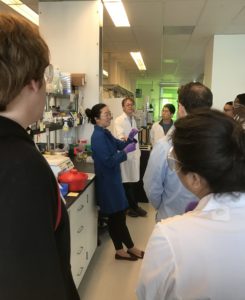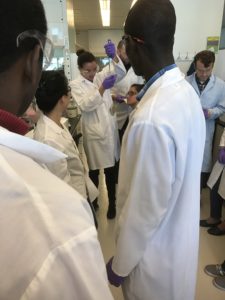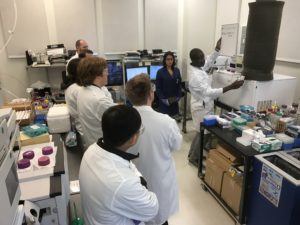The training was targeted at Biosciences Area’s Software Developers
JBEI hosted for a second year a wet lab boot camp targeted at software developers. Following last year’s success, the boot camp returned this time to include 10 software developers from across the Biosciences Area. It included participants from JBEI (Biological Systems & Engineering Division), Agile BioFoundry, DOE Joint Genome Institute (JGI) and Berkeley Lab and Sandia National Lab departments.
The boot camp’s primary goals were to strengthen the software developer community and tighten its integration with the research scientists that it collaborates with. Ultimately it is hoped that there will be a better understanding between software developers and research scientists.
The wet lab boot camp took place November 7 – 11 and included classroom lessons and hands-on laboratory modules. Analytics, including proteomics and metabolomics were this year’s topics and the modules were delivered by seven JBEI instructors.
Given the repeated success of the wet lab boot camp, it is likely that the third annual event (slated for October or November 2017) will be more broadly announced in advance of the event so that a larger number of people are able to participate.
This training will in the long run help scientists and software developers in their day to day work. For instructor Leanne Chan, Senior Research Associate in JBEI’s Proteomics group, “The boot camp was a valuable experience because it allowed us to bridge the knowledge gap between our group and the software developers”. Despite the proteomics group working closely with software developers, “most of them had no idea what kind of work went into obtaining proteomics data”, she added.
Traci Lopez, software developer in JBEI’s Synthetic Biology Informatics Group agreed, “I had taken for granted the data I work with and never grasped how much effort it goes into designing experiments let alone carrying out an experiment to generate this data”. Tyler Backman, a Post Doc in JBEI’s Quantitative Metabolic Modeling group added, “I will be able to learn more from the metabolomics and proteomics data I use for computational modeling, now that I have a deeper understanding of how it was generated.”
For Lopez, other benefits from the wet lab boot camp include learning how scientists use the developers’ applications. “I now have a much better idea of how scientists interact with our application because I got to take a turn at being a user. We are fortunate to have our application users working in the same building as us programmers, but I found the experience much more rewarding to actually go through the process of uploading my own experimental data and going through the workflow”, she concluded.
Research Associate Veronica Benites, one of the Metabolomics instructors, praised how valuable the wet lab boot camp is for scientific innovation, “The camp will help create a more interdisciplinary team”. She added, “even though we can’t be experts in all fields of science, it’s important to have a general understanding of the different subjects involved in a big project. Equipped with the work flow of our everyday wet lab processes, I believe software developers will have more space to be creative about their decisions while manipulating our data, and creating tools to optimize it.”






